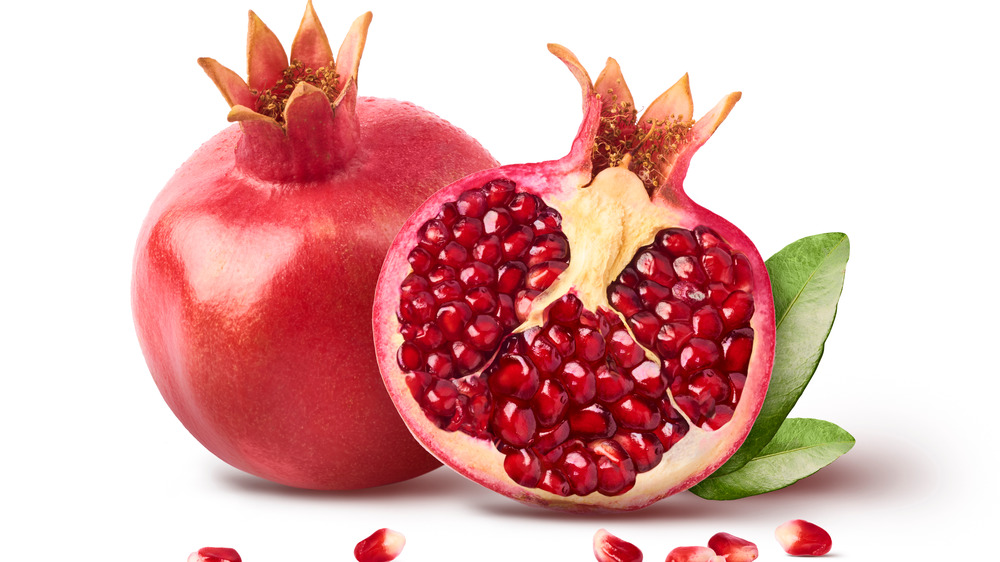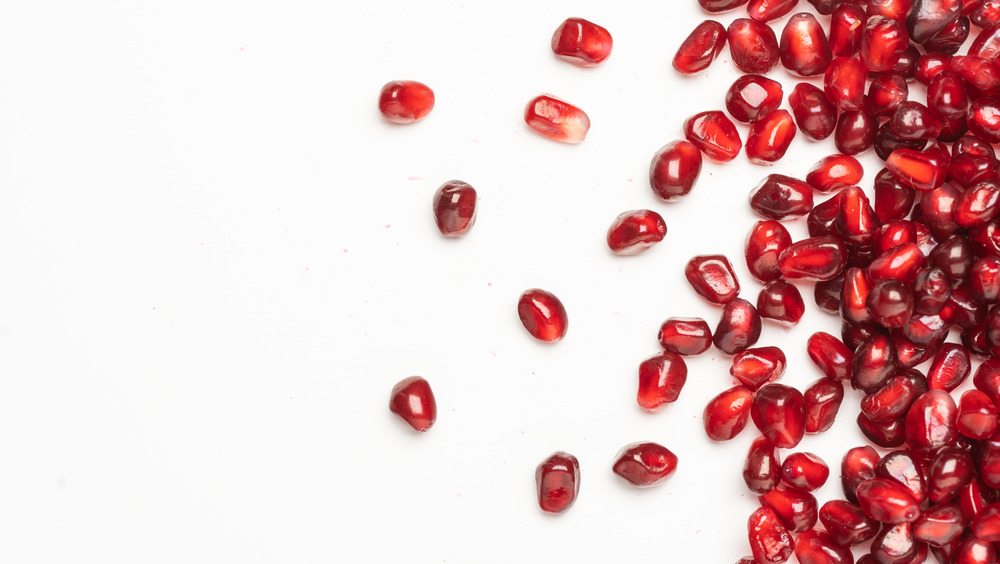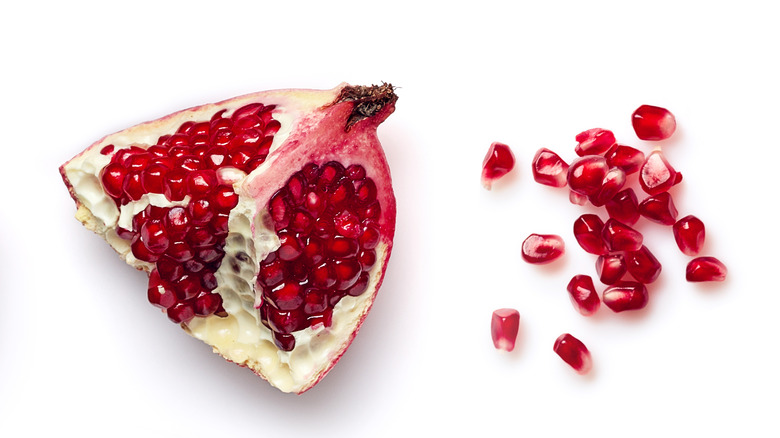When You Eat Pomegranate Seeds, This Is What Happens To Your Body
In many fruits, you want to avoid eating the seeds. Because we avoid seeds in most of our fruits, it almost feels wrong to eat them, and many people wonder if you really should eat pomegranate seeds. But in pomegranates, the seeds are the star of the show. Scooping them out can take some work, but once you taste the pomegranate seeds, which are surrounded in a sweet, juice-filled pod called an aril, it's worth it.
This deep red fruit provides seeds that are a popular garnish for numerous dishes, or on their own as a snack. But what effects, if any, do pomegranate seeds have on the body, and can you eat too many?
Potential pitfalls of pomegranate seeds
Pomegranate seeds can potentially have some negative effects on your body. The fiber mentioned above contains cellulose and lignin, which are insoluble and do not break down in your digestive system, according to Healthline. Consuming a large amount of the seeds could cause problems for those with digestive issues like chronic constipation.
Pomegranates can also prove dangerous to our canine friends. The acids and antioxidants within pomegranates can cause digestive issues for dogs, according to Medical News Today, so be sure to keep pomegranates out of your pup's diet.
All in all, pomegranate seeds are perfectly fine to eat for most people. The seeds provide healthy nutrients, have few calories, and typically only present potential issues to those with severe digestive issues. So feel free to load up on this nutritious, delicious fruit.
Health benefits of pomegranate seeds
According to Healthline, pomegranate seeds and pomegranate juice are loaded with health benefits. For starters, they're pretty good sources of vitamin E, magnesium, fiber, antioxidants, and unique fatty acids. Medical News Today notes that a lot of a pomegranate's fiber content is found in the seeds. Also, 48% of your recommended daily intake of vitamin C is found in pomegranate seeds. Not to mention, an entire pomegranate is just 234 calories which makes them fairly low in calories.
To get the most nutrients possible, Medical News Today recommends choosing pomegranates that are fully ripe. You'll be able to tell they're ripe because they'll be heavy with firm skin. Don't worry about any scratches. They won't harm the fruit inside.
When you're ready to eat your pomegranate, begin by cutting the fruit in half and then spooning out all of the tiny red jewels that hold the seed into a bowl. You can juice them or add them to your yogurt, oatmeal, salads, or even desserts.
What part of a pomegranate is poisonous?
Like any food, some people may be allergic or sensitive to pomegranates. According to Livestrong, some symptoms of allergic reaction or sensitivity can include itching, swelling, and difficulty breathing. Moreover, WebMD warns that when eaten in large amounts, the root, stem, and peel are considered possibly unsafe because they contain poisons. If you have any plant allergies, you may be more susceptible to being allergic to pomegranates.
Though it's technically not a poison, pomegranates can interfere with your blood pressure during and after surgery. For that reason, WebMD recommends that you stop eating pomegranates at least two weeks before getting surgery. In addition, pomegranates and pomegranate juice can slow down the body's process of breaking down several types of medications. For example, it's been found that Crestor, Tegretol, Orinase, and Coumadin can all have negative interactions with pomegranate, so be sure to talk with your doctor if you've been prescribed one of these or any other medications.
Do pomegranate seeds cause kidney stones?
Also known as renal calculi, Healthline says kidney stones are solid masses of crystalized calcium, uric acid, struvite, or cystine. They originate in the kidneys and can develop in any part of the urinary tract. In addition to the kidneys, your urinary tract houses ureters, the bladder, and your urethra. Kidney stones can be very painful and they typically occur in people between the ages of 20 and 50. White people and men are more likely to develop kidney stones. Symptoms of kidney stones can include bloody urine, vomiting, nausea, discolored or foul-smelling urine, chills, fever, frequent urination, and urinating small amounts at a time.
Per Healthline, drinking lots of water and reducing your intake of meat, poultry, dairy, and fish can help prevent kidney stones from forming. If you already have kidney stones, a 2014 comparative study published in Urolithiasis shows that pomegranate juice is not harmful, and in fact may even be helpful because it can decrease supersaturation of calcium oxalate.
Healthline adds that the antioxidants found in pomegranates may be beneficial. According to a 2011 analysis published in the Journal of Endourology, adults with a history of kidney stones also had between 8% to 11% fewer antioxidants in their blood.
Do pomegranates make you poop?
According to the National Institute of Diabetes and Digestive and Kidney Diseases (NIDDK), 16% of American adults have symptoms of constipation. Increasing your fiber intake can help eliminate this problem.
Livestrong says that the more fiber you consume, the more water you need to drink to make sure you don't get gassy or cramped up. Mayo Clinic recommends women eat 21 to 25 grams of fiber a day, and suggests 30 to 38 grams for men. Half a cup of pomegranate seeds will give you up to 12% of your daily fiber, according to the U.S. Department of Agriculture (USDA).
A 2014 study published in the International Journal of Current Microbiology and Applied Sciences showed that most of the fiber found in pomegranates is insoluble. That means it increases movement in the intestines and decreases the risk of constipation. In addition to eating pomegranate seeds, drinking pomegranate juice can help prevent and ease constipation. Livestrong recommends just 8 to 12 ounces a day and says to make sure it's unsweetened, 100% pomegranate juice.






